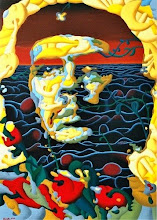Saturday, 21 March 2009
the Songsmith
...HERE'S MICROSOFT'S VERSION OF THE VERSIFICATOR - HORRIFIC!...
..."Everyone Has A Song Inside"
Yes it actually is real!
You can download the demo at
http://research.microsoft.c...
..."Everyone Has A Song Inside"
Yes it actually is real!
You can download the demo at
http://research.microsoft.c...
Monday, 2 March 2009
1984 - BBC (1954)
BBC Television's live production of George Orwell's "1984". Produced in 1954. Creative Commons license: Public Domain.
ORWELL AT THE BBC: 1984
Rudolph Cartier, BBC, 1954
Television drama in the 1950s was still, to quote Mike Leigh, "dead from the neck up." Theatrical warhorses were churned out in mannered and unadventurous styles: the revolution that was Armchair Theatre was still a few years away. But when the notorious 1984 was resurrected at the NFT 30 years after its first screening, it stunned the young audience into a shocked silence and then an ovation.
DID YOU KNOW?
The press claimed that one woman died of fright while watching the drama
Questions were asked in Parliament about the suitability of such strong material for television
1984 was first broadcast live with an original performed score
1984 was made for the then astronomical figure of £3,249. Nigel Kneale (Quatermass, The Year of the Sex Olympics) wrote the script and Peter Cushing headed the cast. Director Rudolph Cartier even stretched to commissioning an original score, which was conducted during the live transmission.
The live performance on Sunday 12 December 1954 scored the highest ratings since The Coronation. Critics were excited at seeing what the new medium was capable of, calling it "a landmark in the at-present short history of television drama" but furious watchdogs campaigned for the planned second performance a few days later to be cancelled. The BBC's Head of Drama Michael Barry refused to concede, and that second live performance was recorded.
Watching 1984 today one cannot help but marvel at the ingenuity of the production. Actors move through 22 sets while the cameras perform a high-speed waltz around the studio to capture the full horror of Orwell's dystopia; filmed sequences are played while sets, cameras and actors are repositioned.
It is interesting that while television makers today, standing on giants' shoulders, can achieve so much with so little effort, there has been a desire in recent years to recapture some of the strange magic that live television offers.
As well as the shared experience offered in interactive live television like Test The Nation and Big Brother, there have also been surprising attempts at resurrecting live drama. In 2000 Channel Four broadcast a live play, while Coronation Street also dabbled briefly with the novelty of the live episode. Is it simply that television drama is out of practice with such pressures, or is it that the old masters have not found worthy successors that resulted in both exercises being failures?
Simon Farquha
ORWELL AT THE BBC: 1984
Rudolph Cartier, BBC, 1954
Television drama in the 1950s was still, to quote Mike Leigh, "dead from the neck up." Theatrical warhorses were churned out in mannered and unadventurous styles: the revolution that was Armchair Theatre was still a few years away. But when the notorious 1984 was resurrected at the NFT 30 years after its first screening, it stunned the young audience into a shocked silence and then an ovation.
DID YOU KNOW?
The press claimed that one woman died of fright while watching the drama
Questions were asked in Parliament about the suitability of such strong material for television
1984 was first broadcast live with an original performed score
1984 was made for the then astronomical figure of £3,249. Nigel Kneale (Quatermass, The Year of the Sex Olympics) wrote the script and Peter Cushing headed the cast. Director Rudolph Cartier even stretched to commissioning an original score, which was conducted during the live transmission.
The live performance on Sunday 12 December 1954 scored the highest ratings since The Coronation. Critics were excited at seeing what the new medium was capable of, calling it "a landmark in the at-present short history of television drama" but furious watchdogs campaigned for the planned second performance a few days later to be cancelled. The BBC's Head of Drama Michael Barry refused to concede, and that second live performance was recorded.
Watching 1984 today one cannot help but marvel at the ingenuity of the production. Actors move through 22 sets while the cameras perform a high-speed waltz around the studio to capture the full horror of Orwell's dystopia; filmed sequences are played while sets, cameras and actors are repositioned.
It is interesting that while television makers today, standing on giants' shoulders, can achieve so much with so little effort, there has been a desire in recent years to recapture some of the strange magic that live television offers.
As well as the shared experience offered in interactive live television like Test The Nation and Big Brother, there have also been surprising attempts at resurrecting live drama. In 2000 Channel Four broadcast a live play, while Coronation Street also dabbled briefly with the novelty of the live episode. Is it simply that television drama is out of practice with such pressures, or is it that the old masters have not found worthy successors that resulted in both exercises being failures?
Simon Farquha
Subscribe to:
Comments (Atom)
